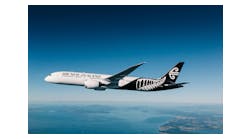Feb. 21--NEW DELHI -- India's struggling private sector airlines have banded together to block the entry of Tata Sons Ltd's low-cost airline in a joint venture with Malaysia-based AirAsia Bhd, and asked the aviation regulator not to grant it a licence for starting operations.
The Federation of Indian Airlines (FIA), the airline lobby group, has written to Director General of Civil Aviation (DGCA) Prabhat Kumar that granting AirAsia (India) Pvt. Ltd (AAIPL) a permit would drive the industry into further losses.
Tata Sons has a 30% stake, AirAsia, 49% and Arun Bhatia of Telestra Tradeplace Pvt. Ltd the rest in AAIPL, the first airline joint venture with foreign direct investment (FDI) announced after the government in September 2012 allowed overseas carriers to invest in local ones.
The 11 February letter from the FIA, which includes Jet Airways, IndiGo, SpiceJet and GoAir, read: "The members of FIA reiterate that application on behalf of AAIPL is not permitted under the FDI policy as it applies only to existing airlines and if allowed will defeat the policy and throw back the existing member airlines into deep losses."
Mint has seen a copy of the letter. State-owned Air India Ltd was not a signatory.
There have been differences in interpreting the September 2012 policy change. Some saw the change to mean that foreign airlines can invest only in existing airlines and not start a new venture with a local partner.
The Delhi high court on 11 February said the issue of FDI in airlines was a matter decided by the government and it had the right to interpret it the way it wanted to.
The government, in its affidavit in the high court, made it clear that the FDI policy for airlines is meant to allow foreign airlines to invest in both new and existing domestic airlines.
SpiceJet confirmed that it had written to the DGCA under the FIA umbrella. A spokesperson for IndiGo said it had also sent its objections to the DGCA. Jet Airways and GoAir spokespersons declined comment.
Tata Sons also has a 51% stake in a joint venture with Singapore Airlines Ltd to start a premium airline.
The new airlines would intensify competition in India's debt-laden and loss-making airline industry, which is burdened by $12.6 billion of debt and $8.6 billion of cumulative losses. The intent behind the FDI notification in September 2012 was "clearly to allow foreign carriers to invest in Indian airlines that were starved of capital", a top private airline executive said, speaking on condition of anonymity.
"The government did the right thing. Now the same notification is being relied upon to set up greenfield ventures, which is perhaps against the original intent," the executive said. "The last thing we need is two more players. This is going to create further capacity and therefore further pain. I must say the timing is really unfortunate."
A spokesman for Tata Singapore Airlines Pvt. Ltd declined comment on the implications the letter may have for its project.
An independent aviation analyst noted that the high court had already ruled that the government had the right to set FDI policy and interpret it.
"There is no case, just sour grapes for all," said the analyst Shakti Lumba, who has previously worked with Air India and IndiGo. "The high court's opinion has greater impact."
Copyright 2014 - Mint, New Delhi




